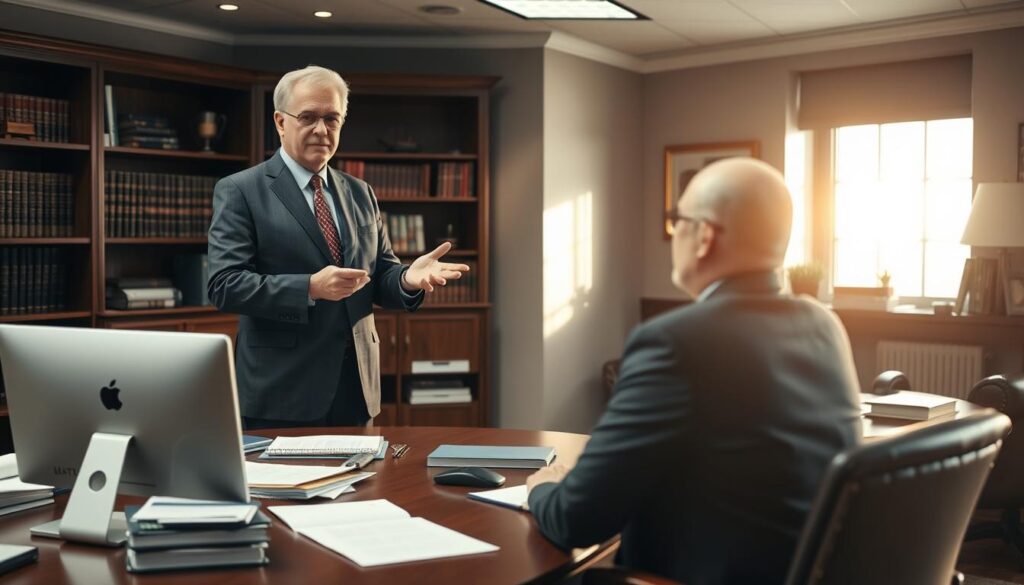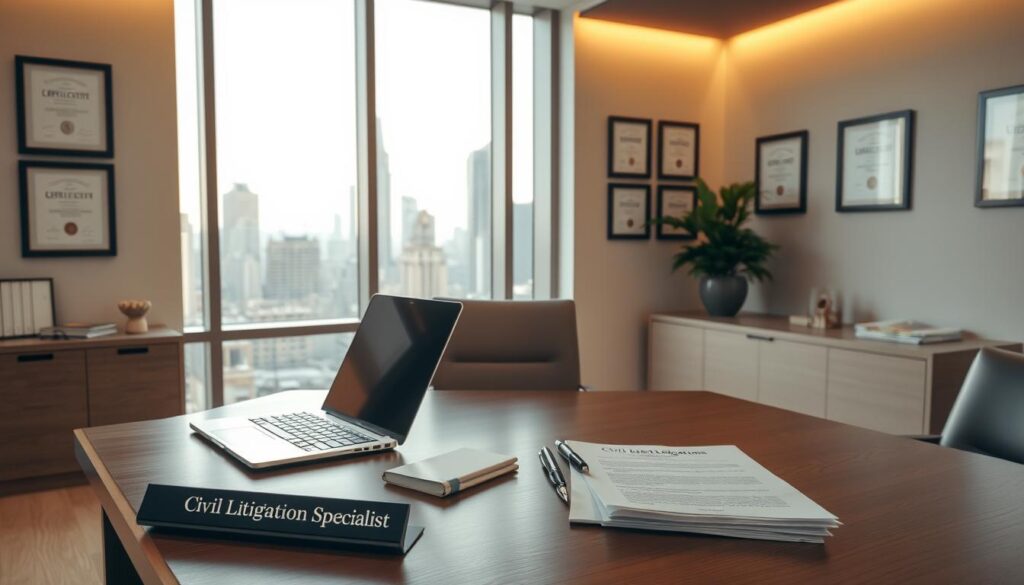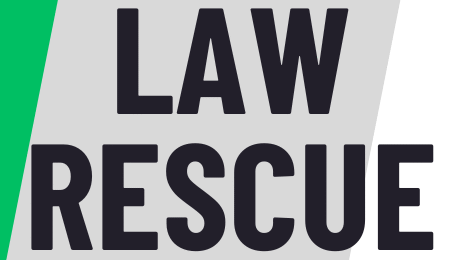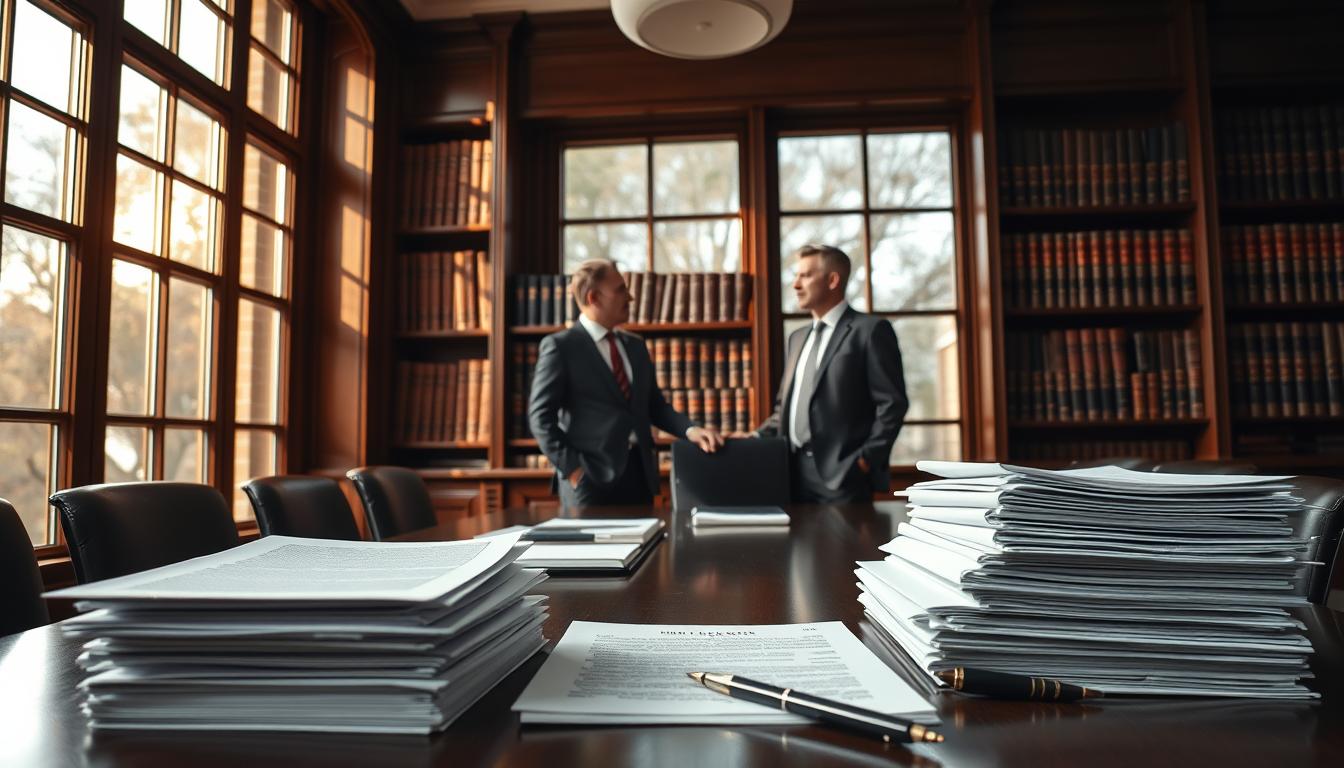Are you facing a legal dispute that seems too hard to handle? Many people and companies get caught up in civil cases. These cases can be very complex and tough to understand.
Did you know most legal cases in the U.S. are civil? They involve many different kinds of disputes. Finding the right lawyer is key in these situations.
Choosing a lawyer who gets your case and what you need is very important. This can greatly affect the result of your case. In this article, we’ll help you find the right lawyer for your civil litigation case.
What Is Civil Litigation and Why You Need Specialized Representation
Civil litigation deals with disputes that aren’t criminal. It helps find a fair solution without criminal charges. This process is used when two parties disagree on something.
Civil cases cover many areas, like contract issues, property problems, and personal injuries. These cases can get very complex. They need a deep understanding of the law and legal steps.
Having a specialized lawyer is key in civil cases. They help you from the start to the end of the case. This can greatly change how your case turns out.
Knowing about civil litigation and the role of a skilled lawyer is important. The right lawyer can help you understand and deal with legal issues better.
Assessing Your Legal Needs Before Your Search
Knowing your legal issue is the first step to finding the right lawyer. Before you hire a lawyer, it’s key to grasp the nature of your legal problem. This will help you figure out the type of lawyer you need and what to look for in legal help.
Determining the Complexity of Your Case
Think about the type of court cases you’re involved in. Are you facing a simple dispute or a complex case with many parties? The complexity of your case will influence the level of expertise you need in a lawyer.
| Case Complexity | Characteristics | Legal Representation Needs |
|---|---|---|
| Simple | Few parties involved, straightforward issues | General legal knowledge |
| Complex | Multiple parties, intricately complex legal issues | Specialized legal expertise |
Understanding your case’s complexity helps you evaluate lawyers better. It’s important to find a lawyer who can handle your specific needs well. Good legal help is key to success in court cases.

Essential Qualities of an Effective Civil Litigation Lawyer
An effective civil litigation lawyer has both legal knowledge and people skills. They must understand the law well to handle legal proceedings. This knowledge helps them create strong strategies for dispute resolution.
A good civil litigation lawyer has a strong legal education. They usually have a Juris Doctor (J.D.) degree and are admitted to the bar. They also keep up with new legal education to stay current.
They must be great at talking to people. They need to explain complex legal ideas clearly to everyone involved. This includes writing important legal documents well.

Being able to negotiate is key too. Many cases settle before trial. A skilled lawyer knows how to get good deals for their clients, being both firm and diplomatic.
They also need to be good in court. This means using their knowledge, thinking strategically, and presenting their case well.
In short, a top civil litigation lawyer has many skills. They need legal knowledge, communication skills, negotiation skills, and court abilities. Knowing these qualities helps you choose the right lawyer for your case.
Understanding Different Areas of Civil Litigation Specialization
When looking for a lawyer for your civil lawsuit, it’s key to know the different areas of civil litigation. Civil litigation covers many cases, like contract disputes, property issues, and personal injury claims.
Each area needs its own set of skills and knowledge. For example, contract disputes deal with complex agreements and negotiations. Property disputes might involve who owns or uses land. Personal injury claims are about getting compensation for injuries caused by someone else’s carelessness.

Knowing these areas helps you find the right lawyer for your case. A lawyer with experience in your type of case can lead to a better outcome.
When searching for a lawyer, think about your case’s specifics. Look for a lawyer with a strong track record in your area. This focused approach can greatly impact your lawsuit’s success.
How to Research Potencial Lawyers Effectively
Looking for the right lawyer is key to getting top-notch legal representation for your case. Start by searching online for civil litigation lawyers in your area. Use directories and review sites to find lawyers with good reputations.
Also, ask friends, family, or professionals for lawyer recommendations. They might know someone good for your case.
After finding lawyers, check their credentials and experience. Look at their education, years of practice, and notable cases. See if they belong to civil litigation organizations.
| Criteria | What to Look For | Why It Matters |
|---|---|---|
| Experience | Years of practice, number of cases handled | Shows they know trial proceedings well |
| Specialization | Focus on civil litigation | Guarantees they’re the right fit for your case |
| Reputation | Client reviews, peer ratings | Shows their professionalism and success |
By following these steps, you can find the best legal representation for your civil litigation case. Look for a lawyer with the right experience and who understands your needs. They should be committed to getting the best result for you.
Evaluating a Lawyer’s Experience in Civil Litigation
It’s key to check a lawyer’s experience before choosing them for your civil case. Their experience in civil cases shows if they can handle litigious matters well.
Look for a lawyer with a good track record in cases like yours. They should have a high success rate in court cases. They also need to know the legal details that can affect your case. A seasoned lawyer knows the whole process, from start to finish.
Also, find out what kinds of cases they’ve worked on. Have they handled contract disputes, personal injury, or employment law? Their experience in your area can be a big plus.
Ask about their courtroom experience too. A lawyer who’s comfortable in court can fight for you better in court cases and litigious matters.
By looking closely at a lawyer’s experience, you can choose wisely for your civil case.
The Importance of Local Knowledge and Court Connections
In civil litigation, a lawyer’s local knowledge and connections are key. They can move through the legal system more smoothly, helping your case. They know the local laws, procedures, and judges well. This lets them prepare for the unique aspects of legal proceedings in your area.
A lawyer who knows the local legal scene can greatly affect your case’s outcome. They offer insights into how local courts handle dispute resolution. This helps in creating a strategy that fits your case’s specific needs.
Also, a lawyer with strong court connections can talk better with court officials and other parties. This can make legal proceedings run more smoothly. And it can lead to a better result for you.
Preparing for Initial Consultations with Legal Representation
Meeting with a lawyer for the first time is key to finding the right legal representation for your case. This meeting lets you see if the lawyer knows how to handle your case well.
To get the most from this meeting, prepare well. Collect all important documents like contracts and legal notices. This makes it easier to explain your case.
Ask questions during the meeting to understand the lawyer’s experience. Find out their plan for your case, how they communicate, and how often they’ll update you.
Talk about costs and how they charge. Knowing this helps you decide if you want them to represent you.
Being ready and asking the right questions helps you choose the best lawyer for your case. This meeting is a chance for both you and the lawyer to see if they’re a good fit.
Understanding Legal Fees and Payment Structures
It’s important to know how legal fees work for your civil case. Legal costs can affect your choice of lawyer. This is true for court cases or any legal disputes.
Legal fees vary based on the agreement with your lawyer. There are mainly three types: hourly, contingency, and fixed fees. Hourly fees mean you pay for each hour worked. This is good for simple cases that don’t take much time.
Contingency fees are a percentage of your winnings if you win. This is common in cases where you’re seeking damages. It means the lawyer only gets paid if you win.
Fixed fees are a one-time payment for a specific task. This can help clear up costs for certain parts of your case.
Knowing about these fees is key to managing costs. When talking to lawyers, ask about their fee options. Make sure they fit your budget and case needs.
Understanding legal fees helps you choose wisely. It lets you handle your civil case with confidence. This knowledge is powerful in the complex world of law.
Assessing Communication Styles and Availability
A lawyer’s ability to communicate well and be there when you need them is key. This affects your case’s outcome and your experience. You need a lawyer who listens and is ready to help with your dispute resolution and legal proceedings.
Look at how a lawyer talks to you during your first meetings. Do they really listen and explain things clearly? Are they willing to answer all your questions and calm your fears about the legal process?
It’s also important to know if a lawyer is easy to reach. You want someone who is there for you, whether it’s for a quick question or a big update on your legal proceedings. Ask them about their call-back policy and how they handle urgent matters.
By checking a lawyer’s communication and availability, you can see if they’re right for you. This helps make your dispute resolution process smoother.
Evaluating the Law Firm’s Resources for Your Civil Litigation Case
A law firm’s resources are key in your civil lawsuit. The skills, knowledge, and support staff they have can greatly affect your case.
These resources include experienced lawyers, investigators, and legal assistants. They work together to find evidence, build a strong case, and represent you well in court.
When looking at a law firm’s resources, think about the firm’s size. Bigger firms might have more resources, but smaller ones could give you more personal attention.
It’s also important to check the firm’s technology and setup. Modern law firms use advanced software and tech to manage cases better. This helps them handle complex cases more efficiently.
Knowing what resources a law firm has can help you choose wisely. It shows if they can handle your civil lawsuit well.
Trust Your Instincts: The Personal Connection Factor
How well your lawyer does their job often depends on how well you get along. When you’re in a legal fight, having a lawyer you trust can really help. It makes your experience better and can even change the outcome of your case.
Creating a personal bond with your lawyer can improve your experience and their work for you. It’s about finding someone who gets both your legal needs and your personal situation. Trusting your instincts about your lawyer’s ability is key.
During your first meetings, notice how well you talk to the lawyer. Do you feel like they really get you? Are they answering your questions well? How they talk to you can show how they’ll handle your legal problems.
A strong connection can make working together better and help them understand what you need. This can make your legal help even better.
Making Your Final Decision and Establishing the Attorney-Client Relationship
After researching, it’s time to choose who will help you in court. This choice is very important because it affects your case’s outcome. You want a lawyer who knows your legal needs and has a plan that fits your goals.
Once you pick a lawyer, it’s key to understand your relationship with them. Talk about what they will do for you and how you’ll communicate. Knowing these things helps you and your lawyer work better together.
Having a good relationship with your lawyer is more than just hiring them. It means both of you understand your needs and the legal plan. Your lawyer should explain the legal steps, possible results, and how they’ll solve your problem.
By choosing wisely and setting up a clear relationship, you can face legal challenges with confidence. Your lawyer will fight for you in court, aiming to get the best result for your case.
Conclusion
Choosing the right lawyer for your civil litigation case is very important. It can greatly affect the outcome of your legal issues. You’ve looked at many factors to help pick the best lawyer for your case.
You’ve thought about what you need legally, the lawyer’s experience, and how they communicate. This helps you make a smart choice. Your lawyer will help you understand the complex legal process. They will make sure your rights are looked after and your interests are represented.
A good outcome in civil litigation comes from many things. These include the lawyer’s skill, local knowledge, and the firm’s resources. By thinking about these, you’ve set yourself up for the best chance of success in your case.

